- Home
- Iain M. Banks
The Wasp Factory Page 2
The Wasp Factory Read online
Page 2
Well, these days I can reach the highest shelves of the house library, and walk into Porteneil to visit the one there, so I can check up on anything my father says, and he has to tell me the truth. It annoys him a lot, I think, but that’s the way things go. Call it progress.
But I am educated. While he wasn’t able to resist indulging his rather immature sense of humour by selling me a few dummies, my father couldn’t abide a son of his not being a credit to him in some way; my body was a forlorn hope for any improvement, so only my mind was left. Hence all my lessons. My father is an educated man, and he passed a lot of what he already knew on to me, as well as doing a fair bit of study himself into areas he didn’t know all that much about just so that he could teach me. My father is a doctor of chemistry, or perhaps biochemistry - I’m not sure. He seems to have known enough about ordinary medicine - and perhaps still have had the contacts within the profession - to make sure that I got my inoculations and injections at the correct times in my life, despite my official non-existence as far as the National Health Service is concerned.
I think my father used to work in a university for a few years after he graduated, and he might have invented something; he occasionally hints that he gets some sort of royalty from a patent or something, but I suspect the old hippy survives on whatever family wealth the Cauldhames still have secreted away.
The family has been in this part of Scotland for about two hundred years or more, from what I can gather, and we used to own a lot of the land around here. Now all we have is the island, and that’s pretty small, and hardly even an island at low tide. The only other remnant of our glorious past is the name of Porteneil’s hot-spot, a grubby old pub called the Cauldhame Arms where I go sometimes now, though still under age of course, and watch some of the local youths trying to be punk bands. That was where I met and still meet the only person I’d call a friend; Jamie the dwarf, whom I let sit on my shoulders so he can see the bands.
‘Well, I don’t think he’ll get this far. They’ll pick him up,’ my father said again, after a long and brooding silence. He got up to rinse his glass. I hummed to myself, something I always used to do when I wanted to smile or laugh, but thought the better of it. My father looked at me. ‘I’m going to the study. Don’t forget to lock up, all right?’
‘Okey-doke,’ I said, nodding.
‘Goodnight.’
My father left the kitchen. I sat and looked at my trowel, Stoutstroke. Little grains of dry sand stuck to it, so I brushed them off. The study. One of my few remaining unsatisfied ambitions is to get into the old man’s study. The cellar I have at least seen, and been in occasionally; I know all the rooms on the ground floor and the second; the loft is my domain entirely and home of the Wasp Factory, no less; but that one room on the first floor I don’t know, I have never even seen inside.
I do know he has some chemicals in there, and I suppose he does experiments or something, but what the room looks like, what he actually does in there, I have no idea. All I’ve ever got out of it are a few funny smells and the tap-tap of my father’s stick.
I stroked the long handle of the trowel, wondering if my father had a name for that stick of his. I doubted it. He doesn’t attach the same importance to them as I do. I know they are important.
I think there is a secret in the study. He had hinted as much more than once, just vaguely, just enough to entice me so that I want to ask what, so that he knows that I want to ask. I don’t ask, of course, because I wouldn’t get any worthwhile answer. If he did tell me anything it would be a pack of lies, because obviously the secret wouldn’t be a secret any more if he told me the truth, and he can feel, as I do, that with my increasing maturity he needs all the holds over me he can get; I’m not a child any more. Only these little bits of bogus power enable him to think he is in control of what he sees as the correct father-son relationship. It’s pathetic really, but with his little games and his secrets and his hurtful remarks he tries to keep his security intact.
I leaned back in the wooden chair and stretched. I like the smell of the kitchen. The food, and the mud on our wellingtons, and sometimes the faint tang of cordite coming up from the cellar all give me a good, tight, thrilling feel when I think about them. It smells different when it’s been raining and our clothes are wet. In the winter the big black stove pumps out heat fragrant with driftwood or peat, and everything steams and the rain hammers against the glass. Then it has a comfortable, closed-in feeling, making you feel cosy, like a great big cat with its tail curled round itself. Sometimes I wish we had a cat. All I’ve ever had was a head, and that the seagulls took.
I went to the toilet, down the corridor off the kitchen, for a crap. I didn’t need a pee because I’d been pissing on the Poles during the day, infecting them with my scent and power.
I sat there and thought about Eric, to whom such an unpleasant thing happened. Poor twisted bugger. I wondered, as I have often wondered, how I would have coped. But it didn’t happen to me. I have stayed here and Eric was the one who went away and it all happened somewhere else, and that’s all there is to it. I’m me and here’s here.
I listened, wondering if I could hear my father. Perhaps he had gone straight to bed. He often sleeps in the study rather than in the big bedroom on the second floor, where mine is. Maybe that room holds too many unpleasant (or pleasant) memories for him. Either way, I couldn’t hear any snoring.
I hate having to sit down in the toilet all the time. With my unfortunate disability I usually have to, as though I was a bloody woman, but I hate it. Sometimes in the Cauldhame Arms I stand up at the urinal, but most of it ends up running down my hands or legs.
I strained. Plop splash. Some water came up and hit my bum, and that was when the phone went.
‘Shit,’ I said, and then laughed at myself. I cleaned my arse quickly and pulled my trousers up, pulling the chain, too, and then waddling out into the corridor, zipping up. I ran up the broad stairs to the first-floor landing, where our only phone is. I’m forever on at my father to get more phones put in, but he says we don’t get called often enough to warrant extensions. I got to the phone before whoever was calling rang off. My father hadn’t appeared.
‘Hello,’ I said. It was a call-box.
‘Skraw-aak!’ screamed a voice at the other end. I held the receiver away from my ear and looked at it, scowling. Tinny yells continued to come from the earpiece. When they stopped I put my ear back to it.
‘Porteneil 531,’ I said coldly.
‘Frank! Frank! It’s me. Me! Hello there! Hello!’
‘Is there an echo on this line or are you saying everything twice?’ I said. I could recognise Eric’s voice.
‘Both! Ha ha ha ha ha!’
‘Hello, Eric. Where are you?’
‘Here! Where are you?’
‘Here.’
‘If we’re both here, why are we bothering with the phone?’
‘Tell me where you are before your money runs out.’
‘But if you’re here you must know. Don’t you know where you are?’ He started to giggle.
I said calmly: ‘Stop being silly, Eric.’
‘I’m not being silly. I’m not telling you where I am; you’ll only tell Angus and he’ll tell the police and they’ll take me back to the fucking hospital.’
‘Don’t use four-letter words. You know I don’t like them. Of course I won’t tell Dad.’
‘“Fucking” is not a four-letter word. It’s . . . it’s a seven-letter word. Isn’t that your lucky number?’
‘No. Look, will you tell me where you are? I want to know.’
‘I’ll tell you where I am if you’ll tell me what your lucky number is.’
‘My lucky number is e.’
‘That’s not a number. That’s a letter.’
‘It is a number. It’s a transcendental number: 2.718—’
‘That’s cheating. I meant an integer.’
‘You should have been more specific,’ I said, then sighed as the pips
sounded and Eric eventually put more money in. ‘Do you want me to call you back?’
‘Ho-ho. You aren’t getting it out of me that easy. How are you, anyway?’
‘I’m fine. How are you?’
‘Mad, of course,’ he said, quite indignantly. I had to smile.
‘Look, I’m assuming you’re coming back here. If you are, please don’t burn any dogs or anything, OK?’
‘What are you talking about? It’s me. Eric. I don’t burn dogs!’ He started to shout. ‘I don’t burn fucking dogs! What the hell do you think I am? Don’t accuse me of burning fucking dogs, you little bastard! Bastard!’
‘All right, Eric, I’m sorry, I’m sorry,’ I said as quickly as I could. ‘I just want you to be OK; be careful. Don’t do anything to antagonise people, you know? People can be awful sensitive . . .’
‘Well . . .’ I could hear him say. I listened to him breathing, then his voice changed. ‘Yeah, I’m coming back home. Just for a short while, to see how you both are. I suppose it’s just you and the old man?’
‘Yes, just the two of us. I’m looking forward to seeing you.’
‘Oh, good.’ There was a pause. ‘Why don’t you ever come to visit me?’
‘I . . . I thought Father was down to see you at Christmas.’
‘Was he? Well . . . but why don’t you ever come?’ He sounded plaintive. I shifted my weight on to my other foot, looked around the landing and up the stairs, half-expecting to see my father leaning over the banister rail, or to see his shadow on the wall of the landing above, where he thought he could hide and listen to my phone calls without me knowing.
‘I don’t like leaving the island for that long, Eric. I’m sorry, but I get this horrible feeling in my stomach, as though there’s a great big knot in it. I just can’t go that far away, not overnight or . . . I just can’t. I want to see you, but you’re so far away.’
‘I’m getting closer.’ He sounded confident again.
‘Good. How far away are you?’
‘Not telling you.’
‘I told you my lucky number.’
‘I lied. I’m still not going to tell you where I am.’
‘That’s not—’
‘Well, I’ll hang up now.’
‘You don’t want to talk to Dad?’
‘Not yet. I’ll talk to him later, when I’m a lot closer. I’m going now. See you. Take care.’
‘You take care.’
‘What’s to worry about? I’ll be all right. What can happen to me?’
‘Just don’t do anything to annoy people. You know; I mean, they get angry. About pets especially. I mean, I’m not—’
‘What? What? What was that about pets?’ he shouted.
‘Nothing! I was just saying—’
‘You little shit!’ he screamed. ‘You’re accusing me of burning dogs again, aren’t you? And I suppose I stick worms and maggots into kids’ mouths and piss on them, too, eh?’ he shrieked.
‘Well,’ I said carefully, toying with the flex, ‘now you mention it—’
‘Bastard! Bastard! You little shit! I’ll kill you! You—’ His voice disappeared, and I had to put the phone away from my ear again as he started to hammer the handset against the walls of the call-box. The succession of loud clunks sounded over the calm pips as his money ran out. I put the phone back in the cradle.
I looked up, but there was still no sign of Father. I crept up the stairs and stuck my head between the banisters, but the landing was empty. I sighed and sat down on the stairs. I got the feeling I hadn’t handled Eric very well over the phone. I’m not very good with people and, even though Eric is my brother, I haven’t seen him for over two years, since he went crazy.
I got up and went back down to the kitchen to lock up and get my gear, then I went to the bathroom. I decided to watch the television in my room, or listen to the radio, and get to sleep early so I could be up just after dawn to catch a wasp for the Factory.
I lay on my bed listening to John Peel on the radio and the noise of the wind round the house and the surf on the beach. Beneath my bed my home-brew gave off a yeasty smell.
I thought again of the Sacrifice Poles; more deliberately this time, picturing each one in turn, remembering their positions and their components, seeing in my mind what those sightless eyes looked out to, and flicking through each view like a security guard changing cameras on a monitor screen. I felt nothing amiss; all seemed well. My dead sentries, those extensions of me which came under my power through the simple but ultimate surrender of death, sensed nothing to harm me or the island.
I opened my eyes and put the bedside light back on. I looked at myself in the mirror on the dressing-table over on the other side of the room. I was lying on top of the bed-covers, naked apart from my underpants.
I’m too fat. It isn’t that bad, and it isn’t my fault - but, all the same, I don’t look the way I’d like to look. Chubby, that’s me. Strong and fit, but still too plump. I want to look dark and menacing; the way I ought to look, the way I should look, the way I might have looked if I hadn’t had my little accident. Looking at me, you’d never guess I’d killed three people. It isn’t fair.
I switched the light out again. The room was totally dark, not even the starlight showing while my eyes adjusted. Perhaps I would ask for one of those LED alarm radios, though I’m very fond of my old brass alarm clock. Once I tied a wasp to the striking-surface of each of the copper-coloured bells on the top, where the little hammer would hit them in the morning when the alarm went off.
I always wake up before the alarm goes, so I got to watch.
2
The Snake Park
I took the little cinder that was the remains of the wasp and put it into a matchbox, wrapped in an old photograph of Eric with my father. In the picture my father was holding a portrait-sized photograph of his first wife, Eric’s mother, and she was the only one who was smiling. My father was staring at the camera looking morose. The young Eric was looking away and picking his nose, looking bored.
The morning was fresh and cold. I could see mist over the forests below the mountains, and fog out over the North Sea. I ran hard and fast along the wet sand where it was good and firm, making a jet noise with my mouth and holding my binoculars and bag down tight to my sides. When I got level with the Bunker I banked inland, slowing as I hit the soft white sand further up the beach. I checked the flotsam and jetsam as I swept over it, but there was nothing interesting-looking, nothing worth salvaging, just an old jelly-fish, a purple mass with four pale rings inside. I altered course slightly to overfly it, going ‘Trrrrrfffaow! Trrrrrrrrrrrrrfffaow!’ and kicking it on the run, blasting a dirty fountain of sand and jelly up and around me. ‘Puchrrt!’ went the noise of the explosion. I banked again and headed for the Bunker.
The Poles were in good repair. I didn’t need the bag of heads and bodies. I visited them all, working through the morning, planting the dead wasp in its paper coffin not between two of the more important Poles, as I had intended originally, but under the path, just on the island side of the bridge. While I was there I climbed up the suspension cables to the top of the mainland tower and looked around. I could see the top of the house and one of the skylights over the loft. I could also see the spire of the Church of Scotland in Porteneil, and some smoke coming up from the town chimneys. I took the small knife from my left breast pocket and nicked my left thumb carefully. I smeared the red stuff over the top of the main beam which crosses from one I-girder to the other on the tower, then wiped my small wound with an antiseptic tissue from one of my bags. I scrambled back down after that and retrieved the ball-bearing I had hit the sign with the day before.
The first Mrs Cauldhame, Mary, who was Eric’s mother, died in childbirth in the house. Eric’s head was too big for her; she haemorrhaged and bled to death on the marital bed back in 1960. Eric has suffered from quite severe migraine all his life, and I am very much inclined to attribute the ailment to his manner of entry into the world. The whole
thing about his migraine and his dead mother had, I think, a lot to do with What Happened To Eric. Poor unlucky soul; he was just in the wrong place at the wrong time, and something very unlikely happened which by sheer chance mattered more to him than anybody else it could have happened to. But that’s what you risk when you leave here.
Thinking about it, that means that Eric has killed somebody, too. I had thought that I was the only murderer in the family, but old Eric beat me to it, killing his mum before he had even drawn breath. Unintentional, admittedly, but it isn’t always the thought that counts.
The Factory said something about fire.
I was still thinking about that, wondering what it really meant. The obvious interpretation was that Eric was going to set fire to some dogs, but I was too wise in the ways of the Factory to treat that as definite; I suspected there was more to it.
In a way, I was sorry Eric was coming back. I had been thinking of having a War shortly, maybe in the next week or so, but with Eric probably going to make an appearance I had decided against it. I hadn’t had a good War for months; the last one had been the Ordinary Soldiers versus the Aerosols. In that scenario, all the 72nd-scale armies, complete with their tanks and guns and trucks and stores and helicopters and boats, had to unite against the Aerosol Invasion. The Aerosols were almost impossible to stop, and the soldiers and their weapons and equipment were getting burned and melted all over the place until one brave soldier who had clung on to one of the Aerosols as it flew back to its base came back (after many adventures) with the news that their base was a breadboard moored under an overhang on an inland creek. A combined force of commandos got there just in time and blew the base to smithereens, finally blowing up the overhang on top of the smoking remains. A good War, with all the right ingredients and a more spectacular ending than most (I even had my father asking me what all the explosions and the fire had been about, when I got back to the house that evening), but too long ago.

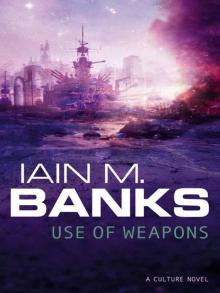 Use of Weapons
Use of Weapons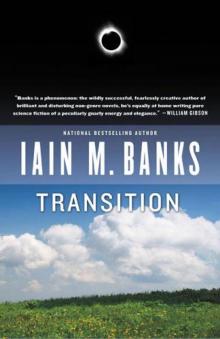 Transition
Transition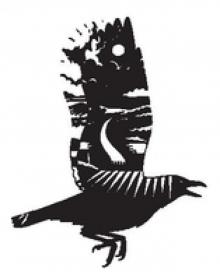 The Crow Road
The Crow Road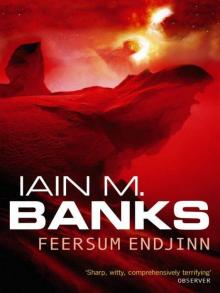 Feersum Endjinn
Feersum Endjinn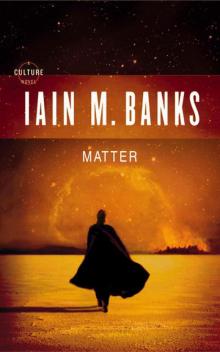 Matter
Matter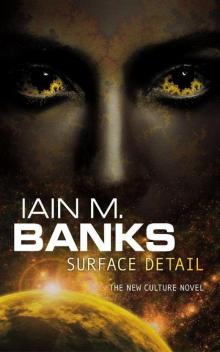 Surface Detail
Surface Detail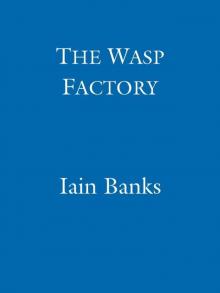 The Wasp Factory
The Wasp Factory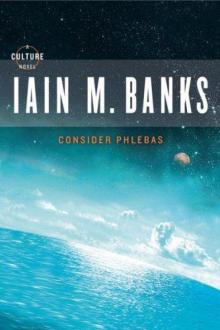 Consider Phlebas
Consider Phlebas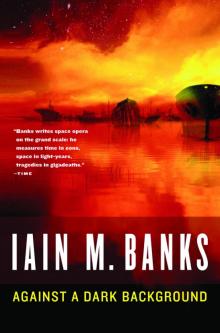 Against a Dark Background
Against a Dark Background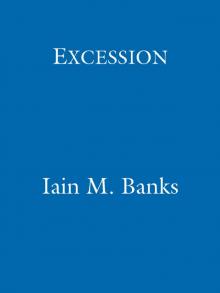 Excession
Excession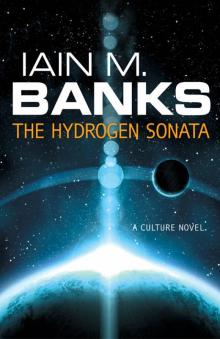 The Hydrogen Sonata
The Hydrogen Sonata The Algebraist
The Algebraist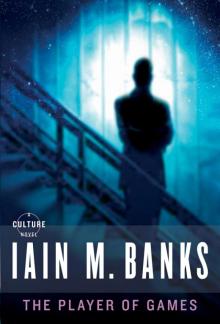 The Player of Games
The Player of Games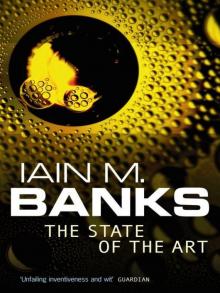 The State of the Art
The State of the Art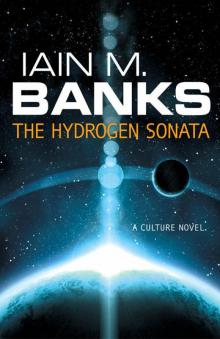 The Hydrogen Sonata c-10
The Hydrogen Sonata c-10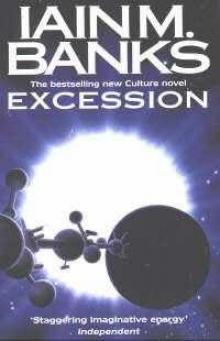 Excession c-5
Excession c-5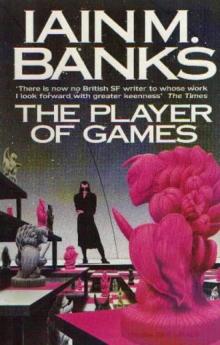 The Player of Games c-2
The Player of Games c-2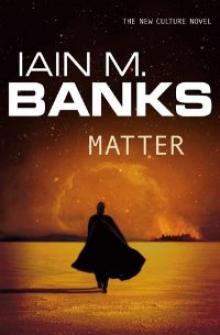 Matter c-8
Matter c-8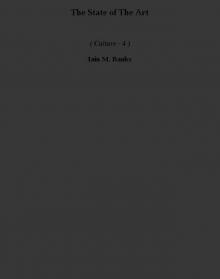 The State of The Art c-4
The State of The Art c-4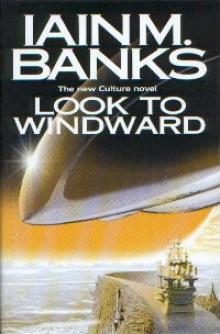 Look to Windward c-7
Look to Windward c-7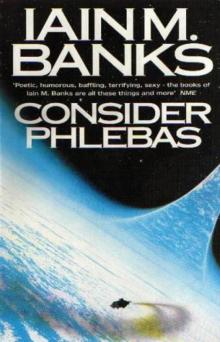 Consider Phlebas c-1
Consider Phlebas c-1